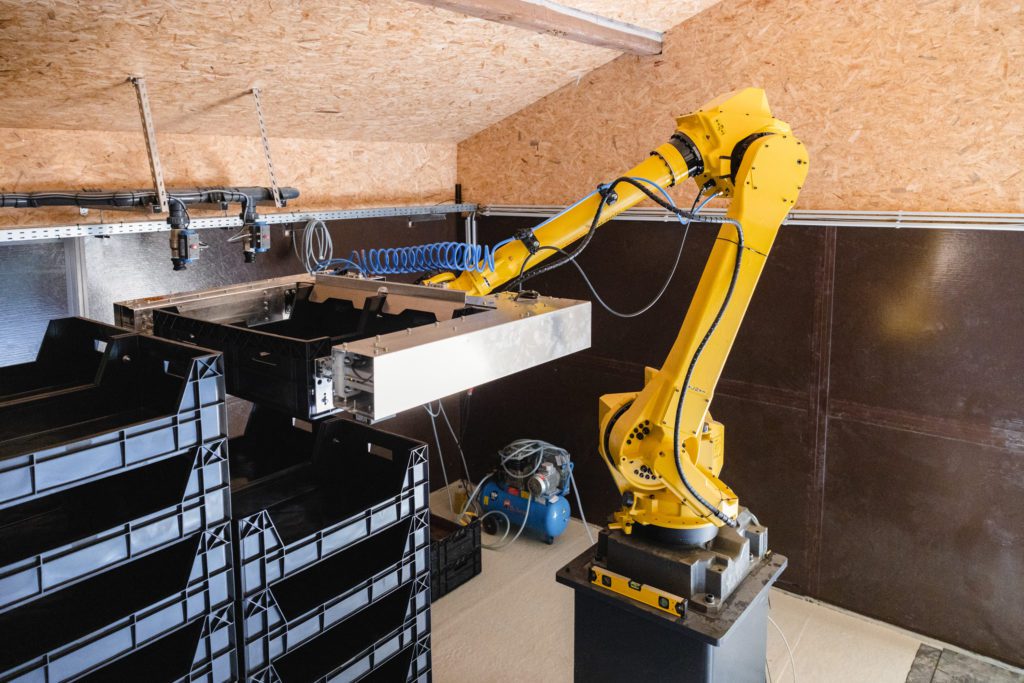By Lynda Kiernan-Stone, Global AgInvesting Media
Munich-based insect farming technology company FarmInsect has closed on an oversubscribed €8 million (US$8.52 million) Series A led by climate tech VC investor Soundwater with participation from Bayern Kapital’s Growth fund, the Minderoo Foundation’s Strategic Impact Fund, the European Innovation Council Fund, and existing investors HTGF and UnternehmerTUM Funding for Innovators.
“We are very grateful for the trust that our investors have placed in us,” said Thomas Keuhn, founder and CEO, FarmInsect. “Together we will pursue our ambitious goal to make insects the go-to protein source ahead of soy and fishmeal in the EU. In this next stage, we plan to intensify our R&D activities in order to decisively expand and further improve the current breeding lines.”
The intersection of insect-based protein in animal feed and the future of feeding a growing population is a promising and sustainable solution – one that can help reduce the strain on traditional agriculture, minimize environmental impacts, and provide a more resource-efficient way to meet the protein needs of both humans and livestock.
Although still far from being mainstream in Western cultures, the numerous benefits of sourcing protein from insects – namely, high conversion rates, the need for less processing compared to plant protein, and being more palatable compared to algae – has prompted a range of startups in the space and interest from the investment universe.
The groundswell in insect-based protein in livestock and aquaculture feed is a promising development that addresses many of the challenges associated with traditional feed sources, such as soy and fishmeal. By providing a sustainable, nutrient-rich, and environmentally friendly alternative, insect-based protein has the potential to revolutionize the way we feed our cattle and marine animals, and contribute to more responsible and sustainable animal agriculture in the future.
Founded in 2020, FarmInsect was part of the first cohort of the Technical University of Munich’s Food, Agro, & Biotech Venture Lab and is developing a more sustainable alternative protein source for animal feed via an end-to-end, modularized solution for the decentralized farming of insects.
Unlike the majority of its rival companies gaining a presence in the insect protein space by building megafactories, FarmInsect is taking a different approach that better utilizes stranded energy and onsite feedstocks, putting the benefits of insect farming directly in the hands of farmers.
Customers of the company construct modular insect farms onsite at their own facilities, and receive weekly shipments of black soldier fly larvae from FarmInsect that are fattened onsite with regional waste materials such as peels or harvest residues. In a week’s time, the larvae grow more than 250 times their body weight. This circular system produces high-quality, protein-rich feed made directly on the farm at a lower financial cost, with lower CO2 emissions, and importantly – independently of global supply chains.
“We’ve recognized the commercial and environmental potential of insects for a long time,” said Morten E. Iversen, partner, Sandwater. “But we struggle with the existing business model, which involves substantial capital investment and has proven difficult to scale. We were missing a commercially available, low capex solution capable of driving meaningful volumes, and FarmInsect offers just that. We strongly believe in the founders’ ability to scale FarmInsect and accelerate the transition away from CO2 intensive protein sources.”
FarmInsect’s fattening systems also produce compost as a by-product, which can then be sold as high-quality fertilizer or used for biogas production, presenting an overall system that allows farmers to save up to 30 percent on feed costs. From beginning-to-end, the company’s entire process is monitored by a proprietary software platform that guides its customers through production step-by-step.
“We were impressed by FarmInsect’s founders as well as its low capex, decentralized business model which has the ability to ramp up significant insect production in a sustainable way, providing the ability to deliver a scalable alternative source of protein to fishmeal,” said Cronje Wolvaardt, director of impact investing, Minderoo Foundation. “This aligns with Minderoo’s goal to protect and restore ocean ecosystems, including by reducing pressure on wild caught fisheries.”
The company explained that the funds gained through this Series A will be used to drive its commercial scaleup, and to continue in the development of its technology.
“One thing was clear to us even with our first stake around two years ago: Insect-based feed is a key part of the puzzle for sustainable and future-proof agriculture,” said Monika Steger, managing director, Bayern Kapital.
“FarmInsect’s experienced team developed the company in a very positive way, installed the first customer systems and opened a new production site. We are highly satisfied with the collaboration to date and see a lot of potential for the future.”
~ Lynda Kiernan-Stone is editor in chief with GAI Media, and is managing editor and daily contributor for Global AgInvesting’s AgInvesting Weekly News and Agtech Intel News, as well as HighQuest Group’s Unconventional Ag. She can be reached at lkiernan-stone@globalaginvesting.com.
*The content put forth by Global AgInvesting News and its parent company HighQuest Partners is intended to be used and must be used for informational purposes only. All information or other material herein is not to be construed as legal, tax, investment, financial, or other advice. Global AgInvesting and HighQuest Partners are not a fiduciary in any manner, and the reader assumes the sole responsibility of evaluating the merits and risks associated with the use of any information or other content on this site.

